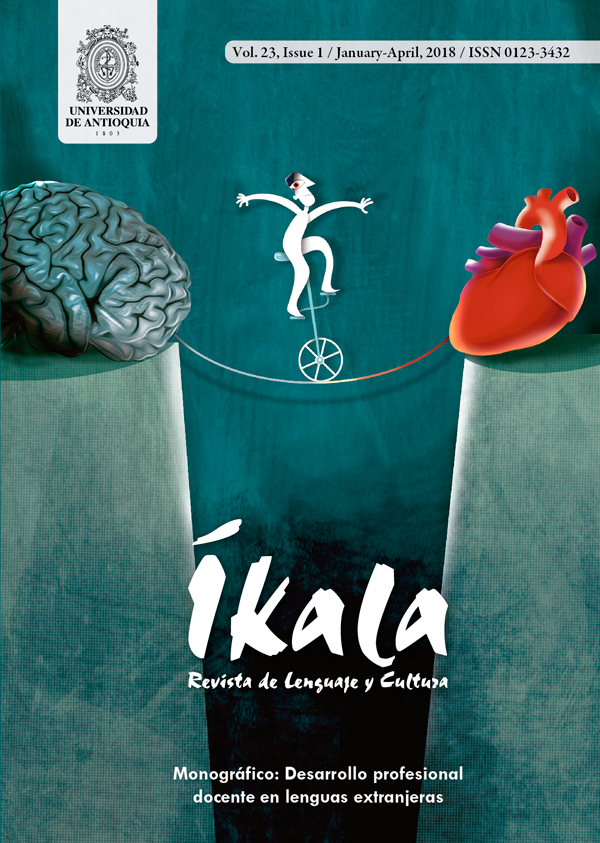The creation of a community of practice to qualify teachers in the integration of ICTs into foreign language learning and teaching processes
DOI:
https://doi.org/10.17533/udea.ikala.v23n01a09Schlagworte:
community of practice, pedagogy, ICT integration, foreign languages, TPACK (Technological, Pedagogical Content Knowledge)Abstract
This article presents the development and final results of a research project, involving the creation of a community of practice (COP) with a group of language teachers, interested in learning and building knowledge about pedagogical and instrumental aspects in integrating ICTs into their teaching practices. COP members worked collaboratively during 2 semesters designing the theoretical foundations, creating video tutorials and designing and implementing encouraging activities to motivate more colleagues to become members. Findings show how the core group and some COP active members increased their pedagogical and instrumental knowledge about the integration of ICT into L2 learning and teaching processes. Involving new members in the encouraging activities was a permanent challenge for the core group of the COP.
Downloads
Literaturhinweise
Acosta, Y. & Poveda, D. (2014). Formación didáctica de profesores de inglés a través de comunidades de aprendizaje. Congreso Iberoamericano de Ciencia y Tecnología, Innovación y Educación. Recuperado de http://www.oei.es/historico/congreso2014/memoriactei/789.pdf
Bozu, Z. & Imbernon, F. (2009). Creando comunidades de práctica y conocimiento en la Universidad: una experiencia de trabajo entre las universidades de lengua catalana. Recuperado de http://www.redalyc.org/articulo.oa?id=78011179004.
Cox, S. & Graham, C. (2009). An elaborated model of the TPACK framework. In I. Gibson et al. (Eds.), Proceedings of Society for Information Technology & Teacher Education International Conference 2009 (pp. 4042–4049). Chesapeake, VA: AACE.
Elliot, D. (2009). Internet technologies and language teacher education. En Thomas, M. (2009). Handbook of research on web 2.0 and second language learning. Nagoya, Japan: University of Commerce and Business.
Enriquez, S. (2014). Una comunidad de práctica como espacio de aprendizaje abierto para docentes. Puertas abiertas: Revista de la Escuela de Lenguas, (10). Recuperado de http://www.puertasabiertas.fahce.unlp.edu.ar/numeros/numero-10/una-comunidad-de-practica-como-espacio-de-aprendizaje-abierto-para-docentes
Galeano Marín, M. E. (2004). Estrategias de investigación social cualitativa, el giro en la mirada. Medellín: La Carreta.
Gómez, L. & Silas, J. (2016). La comunidad virtual de práctica. Alternativa para la formación continua de profesores. Revista de Investigación Educativa, (22). Recuperado de http://revistas.uv.mx/index.php/cpue/article/view/1924/pdf_2
Greca, I. & El-Hani, C. (2015). Docentes e investigadores en comunidades virtuales de práctica para el desarrollo profesional docente y la mejoría de la enseñanza de las ciencias. Revista de la enseñanza de la física. Recuperado de https://revistas.unc.edu.ar/index.php/revistaEF/article/view/11407/11883
Hanewald, R. (2013). Teachers’ learning in online communities of practice: two case studies from Australia. International Conference on Educational Technologies 2013. Retrieved from http://files.eric.ed.gov/fulltext/ED557178.pdf
Imbernón, F. (2011). Un nuevo desarrollo profesional del profesorado para una nueva educación. Revista de Ciencias Humanas. 12(19), 75-86.
Koehler, M., Mishra, P., Kereluik, K., Shin, T. & Graham, C. (2014). The Technological Pedagogical Content and Knowledge Framework (pp. 101-111). En Spector, J. M., Merrill, M. D., Jan, E., & Bishop, M. J. (Edit.) Handbook of Research on Educational Communications and Technology, 4a. ed. New York: Springer.
Mateos-Aparicio, M. (2009). DIM (Didáctica y Multimedia): dinámica y efectividad de una comunidad de aprendizaje con fines educativos. Recuperado de http://www.raco.cat/index.php/DIM/article/view/166861/218930
Nishino, T. (2012). Multi-membership in Communities of Practice: An EFL Teacher’s Professional Development. TESl-EJ. The Electronic Journal for English as a Second Language, 16(2). Recuperado de http://www.tesl-ej.org/wordpress/issues/volume16/ej62/ ej62a1/
Reinders, H. (2009). Technology and second language teacher education. In Bums, A. & J. C. Richards (Eds.). The Cambridge Guide to Second Language Teacher Education, (pp. 230- 237). New York, NY: Cambridge University Press.
Riel, M., & Polin, L. (2004). OnLine Learning Communities: Common Ground and Critical Differences in Designing Technical Environments. En S.A. Barab et al (Eds). Designing Virtual Communities in the Service of Learning. (pp. 16-50). New York: Cambridge University Press.
Rodríguez, J. (2008). Comunidades virtuales de práctica y aprendizaje. Barcelona: Publicacions I Edicions Universitat de Barcelona.
Sanz, S. (2005). Comunidades de práctica virtuales: acceso y uso de contenidos. En: Lara Navarra, Pablo. (Coord.). Uso de contenidos digitales: tecnologías de la información, sociedad del conocimiento y universidad. Revista de Universidad y Sociedad del Conocimiento (RUSC), 2(2). UOC. Recuperado de http://www.uoc.edu/rusc/2/2/dt/esp/sanz.pdf. ISSN 1698-580X//ISBN 84-9788-335-7
Tai, S. J. D. (2015). From TPACK-in-action workshops to classrooms: CALL competency developed and integrated. Language Learning & Technology, 19(1), 139–164. Retrieved from http://llt.msu.edu/issues/february2015/tai.pdf
Universidad: una experiencia de trabajo entre las universidades de lengua catalana. Revista de Universidad y Sociedad del Conocimiento. Recuperado de http://www.redalyc.org/articulo.oa?id=78011179004
Wenger, E. (1998). Communities of practice: Learning, meaning and identity. Cambridge: Cambridge University Press.
Wenger, E., McDermott, R., & Snyder, W. (2002). Cultivating communities of practice: A guide to managing knowledge. USA: Harvard Business School Press. ISBN 1-57851-330-8.
White, S., Léon-Urrutia, M., Borthwick, K., White, S. (2015). Massive Open Online Course Mentoring for a Connected Community of Practice of Language Teachers. Retrieved from
Veröffentlicht
Zitationsvorschlag
Ausgabe
Rubrik
Lizenz
Copyright (c) 2018 Íkala

Dieses Werk steht unter der Lizenz Creative Commons Namensnennung - Nicht-kommerziell - Weitergabe unter gleichen Bedingungen 4.0 International.












